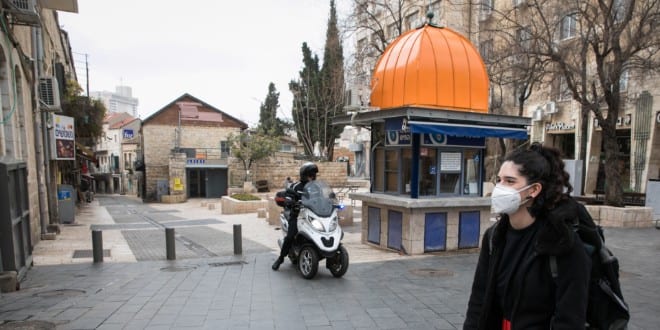Israel’s Health Ministry confirmed Monday that the number of COVID-19 patients in the country had increased to 250. Two patients are in serious condition and the rest are showing little to no symptoms, according to the ministry. So far, four Israelis have recovered from the COVID-19 virus. Nearly 40,000 Israelis are currently under home quarantine, as are thousands of healthcare workers, including 950 doctors.
A ministry official said Sunday that there are concrete fears that over 2,500 Israeli cases have yet to be diagnosed. Israel is expected to receive advanced testing kits on Wednesday, which would allow laboratories to perform 4,000 tests for COVID-19 infection a day, compared to the hundreds they can currently perform.
Health Ministry Director General Moshe Siman-Tov told Army Radio on Monday that as the disease spreads, stricter limitations will have to be imposed on the public.
“I wouldn’t necessarily use the term ‘closure’ but we are going to spend a lot more time indoors. Our lifestyle has to change. Things we think are impossible now will seem routine in a few weeks,” he said.
On Sunday, the government approved a series of emergency regulations presented by Public Security Minister Gilad Erdan, including, among other things, hefty fines for those who violate quarantine directives or public gathering orders. According to current directives, public gatherings are restricted to under 10 people. Fines will range from NIS 3,000 to NIS 5,000 shekels ($800 to $1350), depending on the circumstances.
In addition, the ministers approved regulations designed to prevent the virus from spreading in the prison system. The prisoner population, being confined to a small space, is at greater risk of infection.
Under the new regulations, arraignment hearings will take place via video conference, all visitations have been limited, including by lawyers. While the emergency regulations are in effect—an initial period of five weeks—prisoners will only be allowed to consult with their lawyers over the phone.
“In order to stop the spread of the coronavirus and protect public health, we must constantly initiate and change the way our internal security bodies operate. By doing so, we can win the war on the virus,” said Erdan.
This article first appeared in Israel Hayom.
Source: Israel in the News

